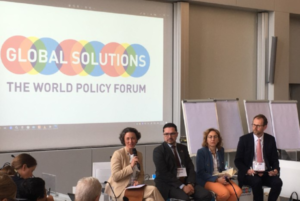On 15 and 16 May, the Global Solutions Summit took place in Berlin. The international conference serves to discuss research-based policy recommendations for the G7, G20 and beyond.

©Global Solutions Initiative
SDSN Germany organised a session entitled „Overcoming Negative Spillover Effects to Advance Sustainable Development“ and held an inspiring panel discussion with renowned experts in this field, Professor Jorge Gómez-Paredes, Elisabeth Sidiropoulos and Professor Anna-Katharina Hornidge. The panel discussion was moderated by Dr Axel Berger and commented on by Dr Camilla Bausch. It became clear in the session that for a global implementation of the 2030 Agenda with its 17 Sustainable Development Goals (SDGs), negative spillover effects must be prevented worldwide. To effectively address negative spillover effects, they have to be better measurable. This requires support in developing robust data and information systems to monitor negative spillover effects. The insights gained must be increasingly incorporated into national and international reports on the progress of the SDGs and integrated into existing indices. Furthermore, legally binding structures that support the reduction of negative spillover effects are needed. In addition to national regulations, such as the examination of policies for transboundary impacts before their implementation, international initiatives are particularly necessary. Solutions need to be developed jointly, international partnerships need to be formed and political coherence needs to be established. Multilateral forums, such as the G7 and G20, are responsible for setting the issue on the global agenda and taking responsibility. At the same time, the G77, as an association of countries of the Global South within the UN, needs to be more involved in discussions and their perspectives strengthened. In addition, a reform of the World Bank is central to strengthening the countries strongly affected by negative spillover effects, as their debt and financial disadvantages increase their vulnerability and make them unable to act. In general, the question must be asked what influence reciprocity as a serious taken principle has on policy-making.
SDSN Germany will continue to work on negative spillover effects and plans to organise a side event at the High-Level Political Forum on Sustainable Development in New York.
Schreibe einen Kommentar